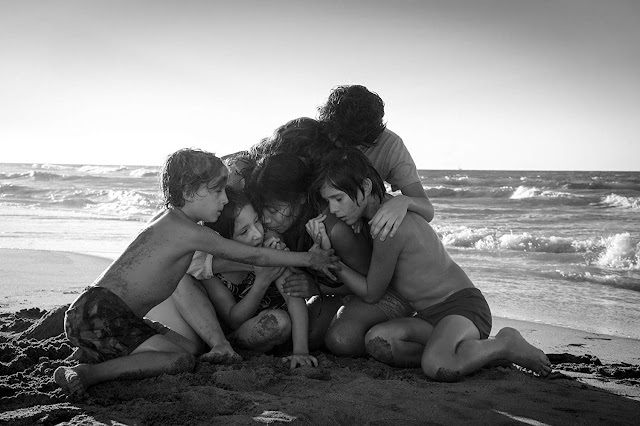BFI LFF 2018: ROMA - Dir. Alfonso Cuaron
After his Oscar winning space roller coaster ride, Alfonso Cuaron doesn’t so much come crashing down to Earth as land gracefully, so as not to drown out the sounds of swashing water that open his latest feature.
Roma is set in a late 1970’s Mexico City and in the townhouse of a seemingly well to do Spanish family and their Mexican house staff. Principal maid and nanny Cleo (Yalitza Aparicio) aims to ensure the smooth running of the family’s life. However, political unease in the city is growing and significant change is on the horizon much closer to home too.
Gravity was ultimately the story of personal survival set against the never ending canvas of space. Although its characters are securely situated on terra firma in Roma, Cuaron tells another deeply personal story on a grand canvas. His canvas this time is Mexico City, a city alive with the hustle and bustle of daily comings and goings.
Cleo lives and works in a townhouse hidden behind an unassuming gates in a suburban street. She’s settled in her daily routine and the film opens on her cleaning up after the family of six (and a very messy dog). Cuaron positions his camera in the empty space at the centre of the townhouse, living rooms and bedrooms situated on the edge of this enclosed space. It’s a safe space, a familiar space. Here Cleo works diligently, preparing for the return of the children from school.
When her days off arrive and Cuaron lets Cleo and Adela, another of the family’s maids, out of the house and onto the streets of the city, Cuaron lets his camera run as free as his characters. The pair rush across street corners and past everybody else going about their daily lives. The depth of the detail and design on display for even the most fleeting of moments is astonishing. Props and set dressing that will never come into play are given as much care and concern as everything else. It’s reminiscent, in one way and this one way only, to the unique pleasures/displeasures of Alexei German’s Hard to be a God, in which barely a second goes by without someone brandishing a particularly putrid looking vegetable in front of the camera. On German’s unspecified planet, it felt arduous; in Cuaron’s Mexico City, it’s immersive.
Even as the film’s story takes characters out of the city and into the countryside, that immersive quality is replaced by the equally staggering natural beauty of the rural landscapes. With no score to help guide proceedings, there’s an almost complete lack of artificiality that acutely amplifies the inherent emotional stress of the more harrowing and upsetting events nearer the film’s conclusion.
As a semi-autobiographical film based on his own childhood, Cuaron’s film works as a tribute to the devotion he experienced from his nanny, but doesn’t quite satisfy as a more truthful portrayal of Cleo’s life. I don’t know what that truthful portrayal would look like, but I couldn’t escape the feeling that the film is perhaps slightly too eulogical. This is ultimately Cuaron’s prerogative and if cinema, as an art form, is a reflection of its orchestrator, then Roma undoubtedly succeeds.
Roma is set in a late 1970’s Mexico City and in the townhouse of a seemingly well to do Spanish family and their Mexican house staff. Principal maid and nanny Cleo (Yalitza Aparicio) aims to ensure the smooth running of the family’s life. However, political unease in the city is growing and significant change is on the horizon much closer to home too.
Gravity was ultimately the story of personal survival set against the never ending canvas of space. Although its characters are securely situated on terra firma in Roma, Cuaron tells another deeply personal story on a grand canvas. His canvas this time is Mexico City, a city alive with the hustle and bustle of daily comings and goings.
Cleo lives and works in a townhouse hidden behind an unassuming gates in a suburban street. She’s settled in her daily routine and the film opens on her cleaning up after the family of six (and a very messy dog). Cuaron positions his camera in the empty space at the centre of the townhouse, living rooms and bedrooms situated on the edge of this enclosed space. It’s a safe space, a familiar space. Here Cleo works diligently, preparing for the return of the children from school.
When her days off arrive and Cuaron lets Cleo and Adela, another of the family’s maids, out of the house and onto the streets of the city, Cuaron lets his camera run as free as his characters. The pair rush across street corners and past everybody else going about their daily lives. The depth of the detail and design on display for even the most fleeting of moments is astonishing. Props and set dressing that will never come into play are given as much care and concern as everything else. It’s reminiscent, in one way and this one way only, to the unique pleasures/displeasures of Alexei German’s Hard to be a God, in which barely a second goes by without someone brandishing a particularly putrid looking vegetable in front of the camera. On German’s unspecified planet, it felt arduous; in Cuaron’s Mexico City, it’s immersive.
Even as the film’s story takes characters out of the city and into the countryside, that immersive quality is replaced by the equally staggering natural beauty of the rural landscapes. With no score to help guide proceedings, there’s an almost complete lack of artificiality that acutely amplifies the inherent emotional stress of the more harrowing and upsetting events nearer the film’s conclusion.
As a semi-autobiographical film based on his own childhood, Cuaron’s film works as a tribute to the devotion he experienced from his nanny, but doesn’t quite satisfy as a more truthful portrayal of Cleo’s life. I don’t know what that truthful portrayal would look like, but I couldn’t escape the feeling that the film is perhaps slightly too eulogical. This is ultimately Cuaron’s prerogative and if cinema, as an art form, is a reflection of its orchestrator, then Roma undoubtedly succeeds.
ROMA screened at the 62nd BFI London Film Festival and was released on Netflix in the UK in December 2018.
---







Comments
Post a Comment